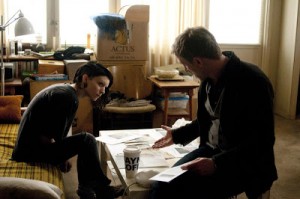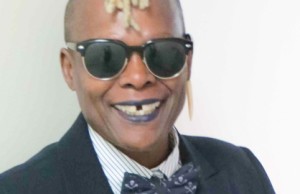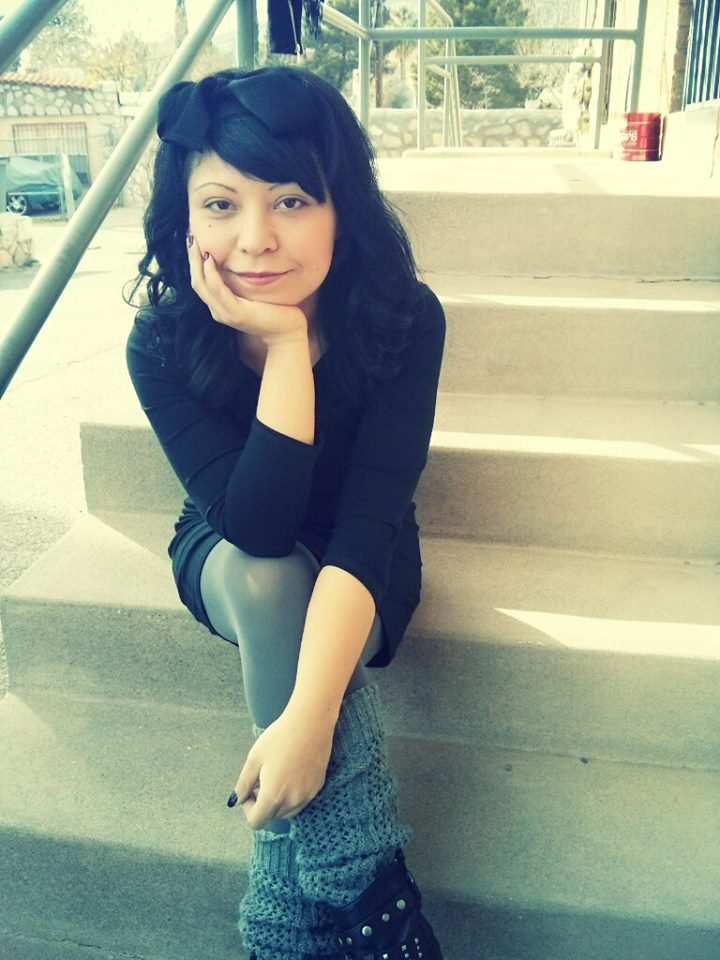The Avenging Woman Onscreen: Man’s Best Friend?
By Lara C. Stache
As most graduates of introductory film class learn, film is not only a source of entertainment but also reflects the society in which we live. One example of this is the Bechdel Test, which received renewed interest last year when Sweden used it as a requirement to rate films. The test, originally created as a colloquial commentary on women in media, says that in order for a film or television show to be “feminist”-approved, it must have two women discussing something other than a man at some point in the story. Although seemingly simple, many films fail this test.
 The past few years have featured an incredible number of strong women fighting back on the big and small screens. With characters like Lisbeth Salander in The Girl with the Dragon Tattoo, Emily Thorne in Revenge, and Katniss Everdeen in The Hunger Games series, media depict women as physically and mentally strong contenders. And, even better, the woman avenger who is righting the wrongs of injustice is not only admirable and believable, but also well received by audiences. This is a fantastic step forward for representations of women in media. But, even a simple critique using the Bechdel test indicates at least one problem with the avenging woman’s characterization: where are her female friends?
The past few years have featured an incredible number of strong women fighting back on the big and small screens. With characters like Lisbeth Salander in The Girl with the Dragon Tattoo, Emily Thorne in Revenge, and Katniss Everdeen in The Hunger Games series, media depict women as physically and mentally strong contenders. And, even better, the woman avenger who is righting the wrongs of injustice is not only admirable and believable, but also well received by audiences. This is a fantastic step forward for representations of women in media. But, even a simple critique using the Bechdel test indicates at least one problem with the avenging woman’s characterization: where are her female friends?
Lisbeth, Emily, and Katniss are solitary female heroes, as are their counterparts in Colombiana (2011), Hanna (2011), and Haywire (2011). Going back even further, films like Lara Croft (2001, 2003), Kill Bill: Volumes 1 & 2 (2003, 2004), Hard Candy (2005), and The Brave One (2007), all represent the avenging woman as fighting her battles alone. Some may argue that a revenge narrative supports the depiction of a lone wolf character. But in the past, some female avengers had girlfriends with whom they could talk. You know, like most women do in real life.
In the 1990s, many of the avenging women of television and film seemed to have close female friends. Thelma had Louise, Buffy had Willow, Xena had Gabrielle. These empowered women were capable of saving the world or fighting back against rape or abuse, but they also had a community of support from other women. Sherrie Inness, author of Tough Girls: Women Warriors and Wonder Women, says that avenging-woman narratives from the 90s show that “toughness in women does not have to be antithetical to friendship.” Being strong does not mean being alone. Sharon Ross, a professor and Associate Chair of the TV Department at Columbia College in Chicago, considers shows like Buffy and Xena progressive because they showed “women coming together in harmony and community rather than envy and competition.”
But current representations of female friendship in the avenging-woman narrative seem to hinge on competition or distrust. In contemporary narratives, other women are sometimes involved in the avenging woman’s plot, but they are depicted as either part of a fleeting relationship or used to manipulate or gather information. In the popular television show Revenge, for example, the only women occasionally in on Emily’s plans have been killed, like Amanda, or shipped off on a jet her first day back in town (bye-bye Ashley).
The lack of female friendships is even more striking in comparison to the number of males in the lives of avenging women. Those heroines that do have friends, or at least helpers, tend to only turn to men. Katniss can lean on Gale, Peeta, and Haymitch, but her sister and mother are both kept on the periphery. Madge Undersee, the Mayor’s daughter in District 12, is depicted in the book as a former childhood friend, but didn’t even make it into the movie. As I watched the season three finale of Revenge, even though I did root for Emily to finally achieve her goals and start to find some happiness, I couldn’t help but notice her only confederates comprised a veritable sausage-fest with Aiden, Nolan, and Jack. And of course, Lisbeth Salander has Mikael.
The frequency of heterosocial friends versus female friends is particularly troubling because it depicts the avenging woman as only being able to count on a man (or men, collectively). In order to be strong, she can rely heavily on male support, both physically and emotionally, but other women are not to be trusted in these representations. With so many media narratives centered on the fragility of female friendships, the continued representation of a strong woman as a “guy’s girl” is both disappointing and unrealistic.
 The lack of sisterhood in contemporary narratives goes beyond the Bechdel Test. For the avenging-woman narrative, it would be a step forward to see two women discussing something other than a man, but it would be even better for the avenging woman to use conversations with her friends to bring attention to the gendered social and systemic issues that “force” her into revenge in the first place. Sarah Projansky, the author of Watching Rape: Film and Television in Postfeminist Culture, cites the conversations between Thelma and Louise as representative of progressive cultural conversations about a woman’s responsibility in cases of rape. In The Girl with the Dragon Tattoo, Lisbeth never tells Mikael (or anybody) she was raped, even though it parallels the story they are working on together. This narrative choice precludes an important conversation about the lack of power some women have within a heteronormative system that privileges white males, particularly those in positions of authority.
The lack of sisterhood in contemporary narratives goes beyond the Bechdel Test. For the avenging-woman narrative, it would be a step forward to see two women discussing something other than a man, but it would be even better for the avenging woman to use conversations with her friends to bring attention to the gendered social and systemic issues that “force” her into revenge in the first place. Sarah Projansky, the author of Watching Rape: Film and Television in Postfeminist Culture, cites the conversations between Thelma and Louise as representative of progressive cultural conversations about a woman’s responsibility in cases of rape. In The Girl with the Dragon Tattoo, Lisbeth never tells Mikael (or anybody) she was raped, even though it parallels the story they are working on together. This narrative choice precludes an important conversation about the lack of power some women have within a heteronormative system that privileges white males, particularly those in positions of authority.
Today, we have some truly entertaining female characters to read about and watch on screen. They shoot, they fight, they tell people what they want, and they don’t need a man to do their work for them. But they don’t have girlfriends. The adage, “Show me your friends and I’ll tell you who you are” comes to mind: who are these strong, avenging women if they are unable to sustain lasting female friendships?
While I do not want to diminish current depictions of bad-ass women, nor to squash the potential these recent images suggest for the future of strong characters in television and film, I do want to see the situation improve even more. We need to think about the messages contained in what we are watching and what they say about women. And, more importantly, we need to be vocal about what (and who) we want to see. Maybe Joseph Gordon-Levitt, self-proclaimed feminist, would be willing to take a crack at writing and directing an avenging-woman narrative—one that showcases female empowerment, but allows for both male and female friendships. As long as he doesn’t cast himself as her best friend.
________________________________
 Lara Stache is a feminist scholar with a research emphasis on media and technology. She is currently a Visiting Assistant Professor at Northern Illinois University, teaching classes with a focus on rhetoric and persuasion. In her spare time, she enjoys media and popular culture of all forms, and sampling the eclectic cuisine of Chicago.
Lara Stache is a feminist scholar with a research emphasis on media and technology. She is currently a Visiting Assistant Professor at Northern Illinois University, teaching classes with a focus on rhetoric and persuasion. In her spare time, she enjoys media and popular culture of all forms, and sampling the eclectic cuisine of Chicago.




2 Comments